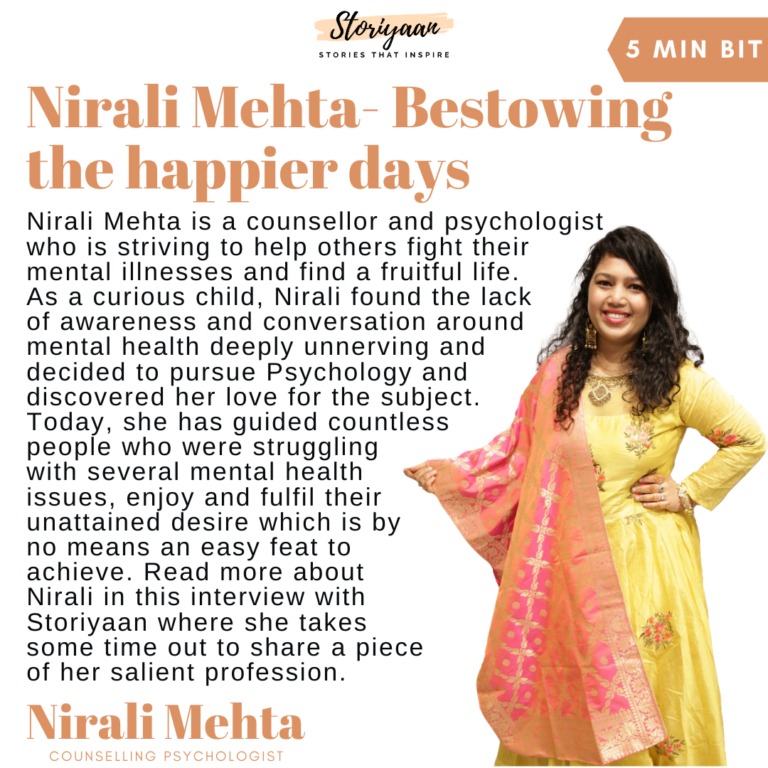Nirali Mehta is a counsellor and psychologist who is striving to help others fight their mental illnesses and find a fruitful life. As a curious child, Nirali found the lack of awareness and conversation around mental health deeply unnerving and decided to pursue Psychology and discovered her love for the subject. Today, she has guided countless people who were struggling with several mental health issues, enjoy and fulfil their unattained desire which is by no means an easy feat to achieve. Read more about Nirali in this interview with Storiyaan where she takes some time out to share a piece of her salient profession.

Interview
Questions and answers
How did you realize the importance of mental health and what made you turn it into a profession?
Mental health has always been a topic long ignored and mocked even though children and adult both suffer from anxiety or restlessness that made me extremely passionate about mental health and I decided to pursue psychology and turned it into a profession.
Can you elaborate on how the mental well-being of a person can affect their overall health?
Mental health affects our body in almost the same way as physical health does. It can significantly impact our productivity, interest and physical well-being.
Mental health is significantly deteriorating in young teens especially in lockdown times. As a therapist, what are some suggestions you would like to give to them?
I feel every teen should be aware of the ‘Three Manageable Goals’ technique which requires you to plan three goals each day which can make you feel a sense of accomplishment. You can also visualise your day to manage it easily and practice self-care measures religiously.
What are some self-care tips that everyone must follow to take care of their mental health?
I have only one thing to say when it comes to Self-care- “It is all about the sense of being happy in your existence.”
Self-care can be personalised and each one must be ready to accept and give themselves the love and happiness that they always deserved.
A lot of people usually do not open up due to societal stigmas and even if they do so they are hesitant to take therapy. How do you deal with people who do not open up during therapy?
I tell my clients that I am here to guide them to find a unique perspective that will help them in their journey towards healing. This has worked out in making my clients ease and feel comfortable.
Can you tell us about your fondest memory of how you have helped someone to feel better about themselves?
All my clients create a unique experience and I am fond of them all. I like to create a space for them to open up through sessions like creating art or having a lively discussion about their passion and interests which has always brought wonderful insights and treasures of knowledge into my profession – this is something I cherish.
You once said, “I reject the idea of being grateful for the pain just because it made you stronger.” Can you elaborate on the same?
My client once told me that “To be stronger, it didn’t feel fair to me to go through such trauma” which is very true. We should avoid romanticising trauma, sometimes there is no silver lining or a happy ending after your terrible days and you don’t need to be grateful to your trauma only because it made you stronger.

